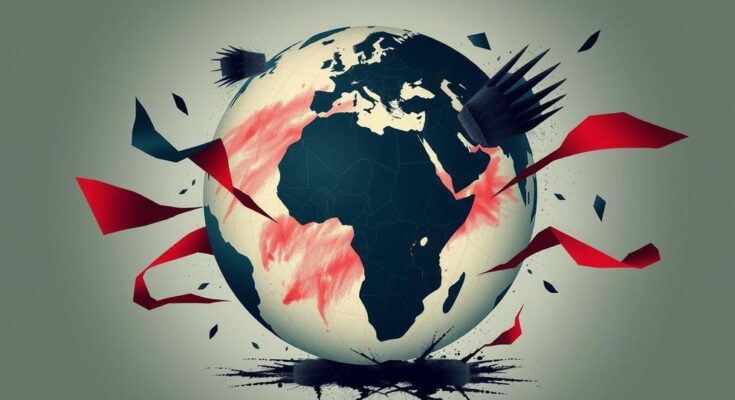The DRC has accused Rwanda of a “declaration of war,” demanding UN sanctions following an increase of Rwandan troops near Goma, where the M23 has advanced. Tensions escalated after peace talks collapsed and significant casualties among peacekeepers were reported. The DRC seeks immediate international intervention to cease hostilities and prevent further deterioration of the situation.
The Democratic Republic of Congo (DRC) has urged the United Nations to impose sanctions on Rwanda, accusing it of a “declaration of war” after an influx of Rwandan troops was reported crossing the border. Rwandan-backed M23 forces have been advancing towards Goma, the capital of DRC’s North Kivu province, amidst claims that this action constitutes a violation of DRC’s national sovereignty.
Congolese Foreign Minister Therese Kayikwamba Wagner highlighted the severity of the situation, noting that the recent arrival of Rwandan soldiers significantly escalates the conflict. She called for immediate targeted sanctions against Rwandan officials, including asset freezes and travel bans, in response to these actions. The DRC’s top diplomat emphasized this ongoing violation of sovereignty was an open affront that could no longer be veiled by diplomatic niceties.
The conflict has already led to casualties, including the deaths of foreign peacekeepers. UN Secretary-General Antonio Guterres has urged Rwanda to withdraw its troops and cease support for the M23, while also calling on the M23 to halt hostilities and withdraw from occupied territories. The city of Goma has experienced heavy detonations, and the civilian population is increasingly affected as conflicts draw closer.
The tensions between the DRC and Rwanda intensified following the cancellation of peace talks between the Rwandan and Congolese Presidents in December, allowing the M23 to quickly advance towards Goma. In light of the increasing violence and associated casualties, both the African Union and the United States have voiced concerns, demanding an immediate ceasefire.
In a broader context, the DRC has accused Rwanda of leveraging the M23 to access its mineral resources. Fearful of the conflict’s implications, Kinshasa has called for a total ban on the export of minerals labeled as Rwandan, particularly gold. The escalation in diplomatic tensions has resulted in both nations recalling their respective ambassadors, signaling a significant breakdown in relations.
Historical context reveals that Goma had briefly fallen to the M23 in 2012, following which the group was militarily subdued in 2013. Despite multiple ceasefires declared since then, lasting peace remains elusive as various armed groups continue to vie for control in the resource-rich eastern DRC, which has been plagued by violence for over three decades.
The Democratic Republic of Congo has a long-standing conflict characterized by the engagement of various armed groups, influenced by regional dynamics involving neighboring nations, notably Rwanda. The M23 movement, which has previously occupied parts of DRC, allegedly receives support from Rwanda. Recent geopolitical tensions and negotiations aimed at peace have failed, leading to escalated military actions and significant humanitarian crises along the DRC-Rwanda border, particularly affecting Goma, a key urban center with a sizable population of displaced persons.
The situation between the DRC and Rwanda has taken a grave turn, prompting calls for UN intervention and sanctions against Rwanda for its military support of the M23. The escalation of armed conflict threatens peace and stability in the region, impacting countless civilians. Urgency in diplomatic negotiations and an immediate cessation of hostilities are crucial to avert further humanitarian crises and restore peace in the region.
Original Source: www.citizentribune.com




